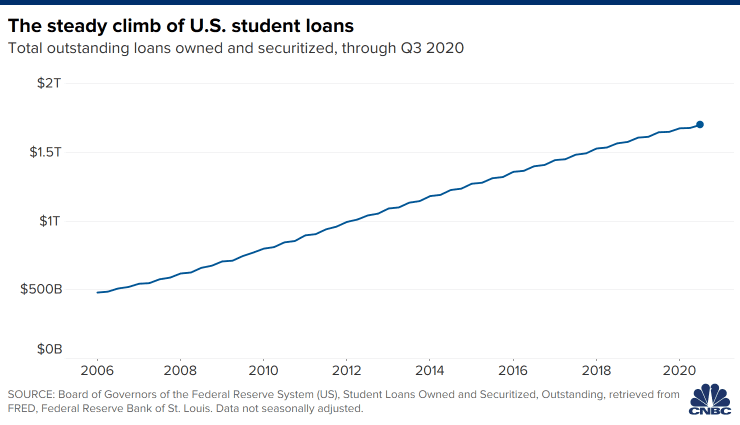
- Senate Democrats have added a provision to their stimulus package that would end the policy of considering any student debt forgiven taxable income.
- If the legislation becomes law, some borrowers could save $10,000 or more.
- Advocates also hope the move signals that broad student debt forgiveness is coming.
A significant provision making any student loan forgiveness tax-free has been included in the $1.9 trillion federal coronavirus stimulus package that’s working its way through Congress and will likely soon be signed into law.
Currently, any student cash loan debt canceled by the government can be considered taxable and levied at the borrower’s normal income tax rate.
For example, if someone earns $50,000 a year, and was at a 22% tax rate, and received $30,000 in student loan forgiveness, they might be slapped with a $6,600 bill from the IRS.
Soon, borrowers may be off the hook from these payments.
What borrowers stand to save
There are around 45 million student loan borrowers in the U.S.
A third of these borrowers are enrolled in “income-driven repayment plans.” These plans aim to make borrowers’ payments more affordable by capping their monthly bills at a percentage of their discretionary income and canceling any of their remaining debt after 20 or 25 years. At that point, their forgiven loans are treated as income and the IRS sends the borrower a form called a 1099-C.
“It’s as if someone gave money to the borrower to repay the debt,” said higher education expert Mark Kantrowitz. If you are actually looking for a good deal on a loan, see this loan lender review which might help you find what you need.
The tax bill can be significant: Let’s say a borrower earns somewhere roughly between $85,000 and $160,000, falling at a 24% tax rate. If they had $48,000 in student debt canceled by the government, they’d have to write the IRS a check of $11,520, according to an example provided by Kantrowitz.

The Student Loan Tax Relief Act, introduced by Sen. Elizabeth Warren, D-Mass. and Sen. Bob Menendez, D-N.J., and now a part of the incoming stimulus package, would end this policy. Any student debt forgiven would not impact a borrowers’ tax liability.
The provision would last through 2025, but it could be extended or become permanent.
Borrowers in income-driven repayment plans would be impacted most by the change. Other student debt forgiveness plans, including a popular one for public servants and another that cancels the debt for those with serious disabilities, are already nontaxable.
A good sign for debt forgiveness?
Advocates also hope that making student loan cancellation tax-free will remove an obstacle in the way of President Joe Biden forgiving student debt.
“This will pave the way for President Biden to provide real relief to student borrowers without fearing they’ll receive a huge tax bill they cannot afford,” Ashley Harrington, federal advocacy director at the Center for Responsible Lending, said in a statement over the weekend.
Critics of student loan forgiveness contend that it will fail to stimulate the economy because college graduates tend to be higher earners who will put their monthly payments into savings and not spend more. Others say a debt jubilee is unfair to those who’ve already paid off their loans or never took them out, while sending the message that it’s OK for people to ditch their debts.
Proponents, meanwhile, say that student loan borrowers were already in crisis before the Covid pandemic — with a third of borrowers in delinquency or default — and that the pain has only worsened after a year of record high unemployment. They also point out that it’s people of color bearing the brunt of the student loan crisis, and it’s also Black and Hispanic Americans who’ve financially suffered the most from the pandemic.
Biden says he’s in support of $10,000 in student loan forgiveness, but he’s under mounting pressure from members of his own party, advocates and borrowers to go further and cancel $50,000 per borrower.
If that forgiveness became tax-free, $10,000 in cancellation would save the average borrower around $2,000 in taxes, according to a rough estimate by Kantrowitz. If $50,000 per borrower was canceled, the average person would avoid a $10,000 tax bill.










